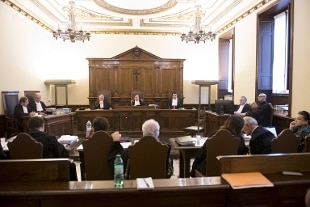Investigations IOR, Caloia: "Stranger to the facts but I resign from Fabbrica Duomo Milano"
Ior, former president Caloia and former general manager Scaletti under investigation for embezzlement
Share
January 21, 2021 The president of the Vatican Tribunal Giuseppe Pignatone read the sentence which establishes that Angelo Caloia and Gabriele Liuzzo were sentenced to 8 years and 11 months in prison for the crimes of money laundering and aggravated embezzlement, and to pay a fine of 12,500 euros.
Lamberto Liuzzo was sentenced to 5 years and two months and to pay a fine of 8 thousand euros;
the three defendants were banned from public office in perpetuity.
The court also ordered the confiscation of the sums already seized from the current accounts of the accused, and ordered compensation to the IOR and Sgir of around 23 million.
The first hearing in May 2018
After more than two and a half years from the first hearing on 9 May 2018, Ansa explains, the trial of the former president of the IOR Angelo Caloia, the lawyer Gabriele Liuzzo and the latter's son, Professor Lamberto Liuzzo, is concluded. in the case of real estate divestments carried out by the Vatican bank between 2001 and 2008, with complex transactions considered by the Oltretevere investigators to their personal benefit and with damage to the Institute valued at a total of 57 million euros.
In the last hearing, on 2 December last, the adjunct justice promoter Alessandro Diddi had asked for an eight-year sentence for embezzlement, money laundering and self-laundering for Caloia (now 81 years old, successor of Mons. Marcinkus as president of the IOR where he remained for twenty years, from 1989 to 2009) and for the lawyer Liuzzo (97 years, declared in default at the beginning of the trial), in addition to the direct confiscation of the 32 million euros already seized on their accounts also at the IOR, and the confiscation for the equivalent of another 25 million euros.
The reason for the request, it was specified, was "to have appropriated a large part of the real estate assets of the so-called Vatican bank, 'sold off' to themselves through a complex shielding operation through offshore and Luxembourgish companies and after the money had Europe. Virtually all the properties owned by the IOR are now available, in particular luxury apartments in Rome and Milan ".
Six years in prison had been requested instead for Lamberto Liuzzo, for recycling and self-laundering.
The president of the Vatican Tribunal, Giuseppe Pignatone, then announced that the sentence would be handed down in the hearing scheduled for today.
Following the news on the emergence of the investigation, in December 2014, Angelo Caloia, an exponent of Lombard Catholic finance and a leading executive in the Italian banking system, while declaring himself totally unrelated to the accusations and "victim of operations engineered by others", he had to resign from all corporate and academic positions in Italy and also from the presidency of the Veneranda Fabbrica del Duomo di Milano.
The long process made use of complex appraisals on each of the properties being sold and also, in the last two years, of the results of the three letters rogatory presented in Switzerland, the statement of which arrived at the Vatican on January 24, 2020, with the quantification, between the other, of the bank accounts concerning two defendants.
Initially, the promoter of Vatican justice Gian Piero Milano had also indicted the former director general of the IOR, Lelio Scaletti, who died at the end of 2015. As evidence of past eras definitively closed, the IOR became a civil party in the process, together to Sgir, a real estate holding company of the Vatican Institute.
In his conclusions, the lawyer Alessandro Benedetti, lawyer of the IOR, requested a provisional provision of about 35 million euros (overall for the IOR and Sgir).
But, he commented with the Huffington Post, "before the economic-compensation aspect, the interest of the IOR was the ascertainment of the responsibilities of the accused and the complete reconstruction of the facts, so much so that, before the trial began, it was a compensation proposal advanced by the accused was rejected by the IOR ".
In short, this process also contains a message, according to Benedetti: "the message is that the party is over and that today there is zero tolerance towards behaviors that have plundered the Institute".

